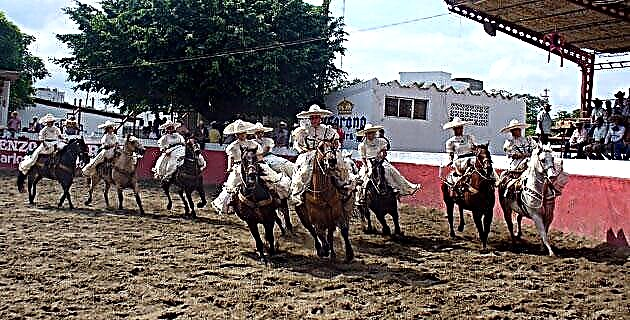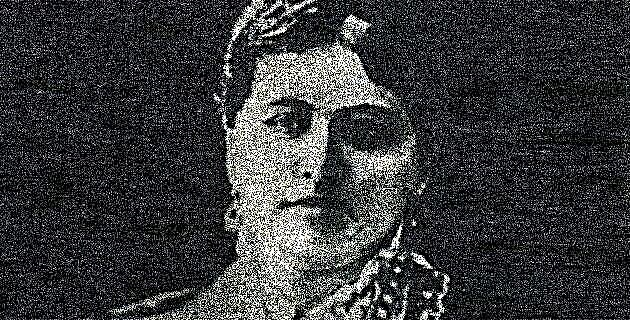
Who was Rosario de la Peña y Llerena really, and what personal virtues and circumstances allowed her to become the hub of a male and-even more-eminently patriarchal literary group, in accordance with the social and moral canons in use?
It is admired by the nocturnal lights
The mountains and seas smile upon him
And it is a rival of the sun,
The imprint of his foot, phosphorescent,
Out garland on the proud forehead
Not from an angel, from a god.
This is how the wise Ignacio Ramírez described in 1874 that woman around whom the best of the nineteenth-century Mexican intelligentsia was grouped: poets, prose writers, journalists and speakers who had chosen her as the “official muse” of the rich literary movement of those years, the same that today we recognize within the national literary history as the post-romantic period.
But who really was Rosario de la Peña y Llerena, and what virtues and personal circumstances allowed her to become the axis of a male and-even more-eminently patriarchal literary group, in accordance with the social and moral canons in use?
It is known that she was born in a house on Calle Santa Isabel, number 10, in Mexico City, on April 24, 1847, and that she was the daughter of Don Juan de Ia Peña, a rich landowner, and of Doña Margarita Llerena, who They educated her along with her brothers and sisters in an environment of social contact and literary updating, since they were related in various ways with personalities of the literature and politics of the time, such as the Spanish writer Pedro Gómez de la Serna and the Marshal Bazaine, of the Empire of Maximilian.
Likewise, when we return to the pages written in Mexico during the last third of the last century, it is surprising to find the frequency -today one might say disproportionate- with which the figure of Rosario appears in the work of the best national poets of that time, always proclaimed "no only as the symbol of the feminine thing, but as the chemically pure essence of beauty ”.
Undoubtedly, Rosario must have been a very beautiful woman, but if to this we add the gifts of talent, good taste, careful instruction, delicate treatment and personal kindness that admirers and friends recognized her, as well as the data about the relevant socioeconomic position of her family, all this, however, would still be insufficient, as not exceptional, to justify the fame of this young woman whose name, without ever having been a writer, is inextricably linked to the history of the national letters of the nineteenth century.
Two other circumstances - one of a historical-literary nature and the other anecdotal - would be the key to his fame. The first, explainable from the socio-aesthetic mentality that characterized romanticism, fosters that fusion of reality and fantasy, and those idolatrous attitudes with respect to the female figure, in which the ideal was superimposed on the real entity in the search for personification. of beauty. As for the second, it occurred on the occasion of the suicide of the already famous writer Manuel Acuña, which occurred in the room that he, as an intern, occupied in the building that at that time belonged to the School of Medicine. The news of this fact was announced the following day, December 8, 1873, together with the first publication of his poem "Nocturno", the most famous song to frustrated love that Mexican lyric has to date, and in which its author, according to the dedication, revealed the details of an alleged love affair between him and Rosario de la Peña. Under other circumstances, this story would have been no more than an interesting rumor mill, but magnified by the terrible halo of the young poet's death, it became a hot spot in all conversations. Moreover, according to José López-Portillo, the matter became metropolitan, national, and it was discussed throughout the Republic, from North to South and from Ocean to Ocean; and not only that, but, eventually exceeding the limits of our territory, it spread throughout all the Spanish-speaking countries of this continent. And as if that were not enough yet, he crossed the waters of the Atlantic, and reached Europe itself, where the episode was treated by the press that was concerned with Spanish-American affairs at that time. The illustrated homeland of this city reproduced a long article published in the Paris Charmant, of the French capital (…) in which it was stated that the sad end of the poet from Coahuila was due to the inhuman infidelity of his beloved. Acuña, according to the columnist, was in love relationships with Rosario and was about to marry her, when he was forced to leave Mexico for business reasons, and not wanting to see her exposed to the dangers of loneliness, he left her entrusted to the care from a trusted friend; and he and she, committing the blackest of ingratitude, had understood each other to love each other during the absence of the poet. So when he returned from his unfortunate journey, he found the unfaithful already married, and then maddened by disenchantment and pain, he desperately appealed to suicide.
Death had given his victim a credit that few and with very little luck dared to deny him. Thus, Rosario de Ia Peña - since then known as Rosario la de Acuña - was forever marked by a history of perfidy and seduction that surpassed the frontier of her century and that, even in the recent eighties, returned to life. light in the reprint of the aforementioned text by López-Portillo, who - despite his avowed purpose of demystifying this female figure - participated once again in the misrepresented interpretation of the famous "Nocturno", and with it, in the defamation of the name of Rosario when affirming that an unfortunate passion could be glimpsed in his verses, "in a reciprocated time, and in the end unknown and perhaps betrayed".
However, there is not a single line from “Nocturno” that confirms this; where the vate began his verses, it is clear that he was initiating a declaration of love to a woman who knew very little, perhaps nothing, about it, as he tells her:
I
Well i need
tell you that I adore you,
Tell you that I love you
with all my heart;
That I suffer a lot,
that I cry a lot,
That I can not so much anymore,
and to the cry in which I implore you,
I implore you and I speak to you on behalf
of my last illusion.
And he still adds in stanza IV:
I understand that your kisses
they must never be mine,
I understand that in your eyes
I will never see myself,
And I love you, and in my crazy
and fiery ravings
I bless your disdain,
I adore your detours,
And instead of loving you less,
I love you more.
As for that stanza VI cited by López-Portillo as possible evidence of a consummated relationship (And after your sanctuary was / finished, / Your lighted lamp, / your veil on the altar, […]), it is the poet himself who tells us that this was nothing more than the description of his longings for love, as shown by the nouns he uses below -dream, eagerness, hope, happiness, pleasure, endeavor-, illuminating only an expectation, an obsession , a desiring will:
IX
God knows that that was
my most beautiful dream,
My eagerness and my hope,
my happiness and my pleasure,
God knows well that nothing
I encrypted my commitment,
But in loving you a lot
under the laughing hearth
That wrapped me in his kisses
when he saw me born!
However, in the post-romantic context (and even in our days), a tragedy of female betrayals and guilt reached easier diffusion than the explanation of a suicide due to pathological hyperesthesia; so that those voices that, according to the Peruvian Carlos Amézaga, stood up in defense of the young woman and, above all, her testimony in favor of her innocence, were hidden under the anatemizing voices of the others, whether they were the illustrious members of the Liceo Hidalgo -who publicly condemned her in the first session held for this purpose after Acuña's suicide- or some of her so-called admirers, who continued to cement the gloomy, even demonic image of Rosario with their poetic works until the end of the century .
When we realize this, we can suppose to what extent that posthumous poem by Acuña and the credit of his fellow men, caused moral and psychological damage to the real Rosario, one of the many real women silenced by history, unable to build her own public image. It is not surprising then to know that despite her clear intelligence, she became a sad, distrustful, anxious and insecure woman, as Martí described her: "you in all your doubts and all your hesitations and all your hopes before me." Nor does it surprise her definitive singleness -despite her many suitors- after a prolonged courtship of more than eleven years with the poet Manuel M. Flores, likewise truncated by his illness and death.
The false mirror of light and shadow superimposed on his real figure, left hidden until today other data that would have illuminated the multiple reasons that led Acuña to suicide, among which his unrequited - and probably unknown - passion for Rosario was only one more cause. Much must have had a bearing on the fatal decision of the hypersensitive young man his prolonged separation from his birth home and the death of his father during his absence -as is repeatedly appreciated in his work-, as well as the infidelity of the poet Laura Méndez, with whom he had sustained for those years an effective love relationship, to the point of having a child with her two months before her suicide.
Apparently, this was the lover who, in the course of a trip by Acuña out of the city, supplanted him in the love affair by the poet Agustín F. Cuenca, a friend of both, to whom he had entrusted the attention of his beloved. to protect it from "the dangers of society." This fact was attributed by history to Rosario, according to López-PortiIlo, despite its incongruity with respect to the fact that she always lived with her parents and siblings, which would have made Acuña's assignment to Cuenca completely unnecessary. On the other hand, this situation would be explained very well if it is the aforementioned poet, if one takes into account that she was a single mother and, on top of that, was distant from her native region: the municipality of Amecameca.
About to turn 50, Rosario de la Peña continued determined to prove her innocence to the few who wanted to hear her, hence, showing a reflective and, despite everything, serene judgment, she expressed to Amézaga, in Private interview, later made known by him: “If I were one of so many vain women, I would insist on the contrary, with feigned expressions of sorrow, to give fuel to that novel from which I am a hero. I know that for romantic hearts there is no greater attraction than a passion with tragic effects such as that attributed by many to Acuña; I know that I renounce, unconditionally, with my frankness, the admiration of fools, but I cannot be an accessory to a deception that has traces of perpetuation in Mexico and other points. It is true that Acuña dedicated his Nocturno to me before he killed himself […] but it is also true that this Nocturno was just Acuña's pretext to justify his death; one of the many whims that some artists have at the end of their life […] Would I be a poet's fantasy on their last night, one of those idealities that participate in something of the truth, but that have more of the raptured dream and the vague moods of that delirium? Maybe that Rosario de Acuña doesn't have anything of mine outside of the name! […] Acuña, with possessing an intelligence of the first order, with being such a great poet, had hidden in the depths of his being that silent despair, that deep dislike of life that ordinarily precipitates suicide, when certain feelings are put together. .
This testimony is the only trace that we have found of his voice, of his real being always glimpsed through the gaze of others. However, the objectivity that still transcends these words - spoken more than 100 years ago - and the prolongation to this day of that fraudulent image of hers, tell us that the story of Rosario de la Peña is not finished, and that the task of illuminating your true face behind the mirror is still much more than a mere exercise against forgetting.











